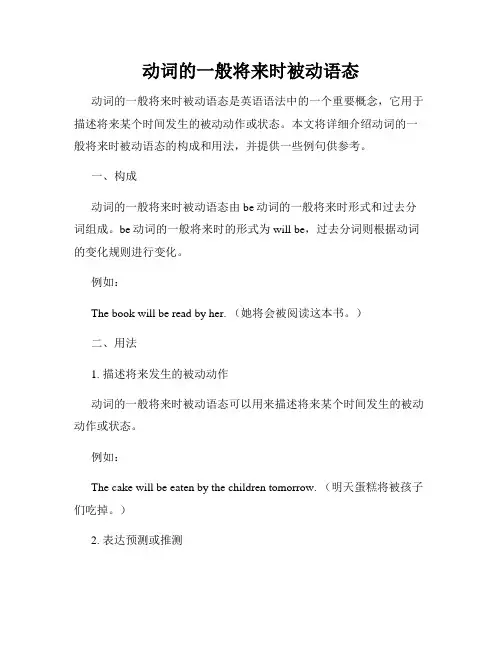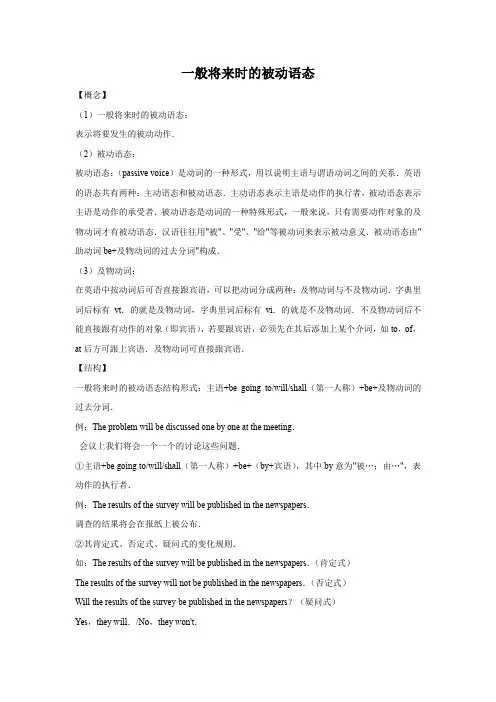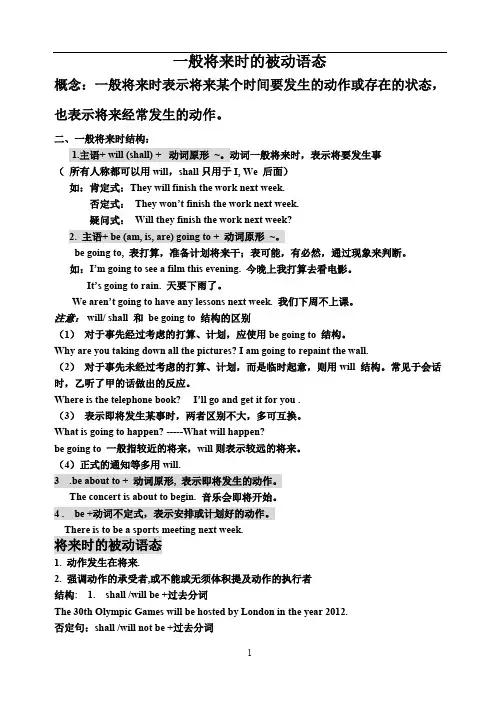(完整版)一般将来时的被动语态
- 格式:doc
- 大小:94.01 KB
- 文档页数:8


一般将来时的被动语态特殊疑问句结构一般将来时的被动语态特殊疑问句结构是指在构成特殊疑问句时,使用一般将来时的被动语态。
在这种结构中,主语成为动作的承受者,并且动作发生在将来的某个时间点。
下面将详细介绍一般将来时的被动语态特殊疑问句的结构并提供一些例句,以帮助读者更好地理解和运用。
一般将来时的被动语态特殊疑问句的基本结构如下:"Will + 主语 + 动词原形 + 其他?"其中,主语通常是动作的受事者或承受者,而动词原形则表示将来要进行的动作。
其他部分包括疑问词和其他修饰词,根据具体情况可以有所变化。
现在我们来看一些例句,以更清楚地理解这种结构的应用:1. Will this book be published next month?(下个月这本书会被出版吗?)在这个例句中,主语是"this book",动词是"be published",表示动作将来会发生。
2. Will the party be held at John's house?(派对会在约翰家举行吗?)这里,主语是"the party",动词是"be held",表示动作将来会发生。
3. When will the new shopping mall be opened?(新的购物中心将在什么时候开放?)这个问题中,疑问词"when"用于询问将来某个时间点的动作,主语是"the new shopping mall",动词是"be opened"。
4. Will the movie be watched by many people?(这部电影会被许多人观看吗?)在这个例句中,主语是"the movie",动词是"be watched",用于表示将来的观看动作。



一般将来时被动语态语态是表示主语和动词之间的主动关系或被动关系的动词形式。
英语动词有两种语态:主动语态和被动语态。
主动语态表示主语是动作的执行者(施动者),被动语态表示主语是动作的承受者(受动者)。
本单元的语法是一般将来时态的被动语态,现就其用法归纳如下:一、一般将来时态的被动语态的基本结构的构成:1.一般将来时态的被动语态的肯定式为:shall / will + be + done。
(shall 用于第一人称;will用于各种人称) 如:We shall be punished if we break the rule.如果我们违反规定,我们将要受到惩罚。
The new film will be shown next Thursday.这部新电影将在下周四上映。
2.一般将来时态的被动语态的否定式为:shall / will + not + be + done.(可缩写成shan’t或won’t)如:The meeting won’t be held tomorrow.明天不再举行会议。
The exhibition won’t be put off till next week.展览会将不会推迟到下周。
3.一般将来时态的被动语态的一般疑问句需将shall / will提到主语的前面。
(回答用yes或no)如:Won’t water be turned into ice, it it is belwo freezing?如果气温在冰点之下,水难道不会变成冰吗---Will the work be finished at once? ---Yes, it will.---这项工作会立刻被完成吗---是的,立刻就完成。
4.一般将来时态的被动语态的特殊疑问句为:疑问词+ shall / will + S + be + done。
如:When will these books be published?这些书将在什么时候被出版Whom will this book be written by?谁来写这本书二、一般将来时态的被动语态的其他结构构成:1.be going to be doneSome old buildings are going to be put down. 一些旧的楼房将被推倒。

动词的一般将来时被动语态动词的一般将来时被动语态是英语语法中的一个重要概念,它用于描述将来某个时间发生的被动动作或状态。
本文将详细介绍动词的一般将来时被动语态的构成和用法,并提供一些例句供参考。
一、构成动词的一般将来时被动语态由be动词的一般将来时形式和过去分词组成。
be动词的一般将来时的形式为will be,过去分词则根据动词的变化规则进行变化。
例如:The book will be read by her. (她将会被阅读这本书。
)二、用法1. 描述将来发生的被动动作动词的一般将来时被动语态可以用来描述将来某个时间发生的被动动作或状态。
例如:The cake will be eaten by the children tomorrow. (明天蛋糕将被孩子们吃掉。
)2. 表达预测或推测动词的一般将来时被动语态还可以用来表达对将来事件的预测或推测。
例如:The concert will be attended by a large audience. (这场音乐会将会有很多观众参加。
)3. 提议或打算在某些情况下,动词的一般将来时被动语态可以用来表示提议或打算。
例如:The meeting will be held in the conference room. (会议将在会议室举行。
)三、例句1. The letter will be sent by John later. (信将会后来由约翰寄出。
)2. The house will be painted by a professional painter next week. (房子将由一名专业的画家在下周粉刷。
)3. The package will be delivered to your address tomorrow. (包裹将在明天送到你的地址。
)4. The project will be completed by the end of this year. (这个项目将在今年年底完成。

一般将来时的被动语态【概念】(1)一般将来时的被动语态:表示将要发生的被动动作.(2)被动语态:被动语态:(passive voice)是动词的一种形式,用以说明主语与谓语动词之间的关系.英语的语态共有两种:主动语态和被动语态.主动语态表示主语是动作的执行者,被动语态表示主语是动作的承受者.被动语态是动词的一种特殊形式,一般来说,只有需要动作对象的及物动词才有被动语态.汉语往往用"被"、"受"、"给"等被动词来表示被动意义.被动语态由"助动词be+及物动词的过去分词"构成.(3)及物动词:在英语中按动词后可否直接跟宾语,可以把动词分成两种:及物动词与不及物动词.字典里词后标有vt.的就是及物动词,字典里词后标有vi.的就是不及物动词.不及物动词后不能直接跟有动作的对象(即宾语),若要跟宾语,必须先在其后添加上某个介词,如to,of,at后方可跟上宾语.及物动词可直接跟宾语.【结构】一般将来时的被动语态结构形式:主语+be going to/will/shall(第一人称)+be+及物动词的过去分词.例:The problem will be discussed one by one at the meeting.会议上我们将会一个一个的讨论这些问题.①主语+be going to/will/shall(第一人称)+be+(by+宾语),其中by意为"被…;由…",表动作的执行者.例:The results of the survey will be published in the newspapers.调查的结果将会在报纸上被公布.②其肯定式、否定式、疑问式的变化规则.如:The results of the survey will be published in the newspapers.(肯定式)The results of the survey will not be published in the newspapers.(否定式)Will the results of the survey be published in the newspapers?(疑问式)Yes,they will./No,they won't.。

一般将来时的被动语态概念:一般将来时表示将来某个时间要发生的动作或存在的状态,也表示将来经常发生的动作。
二、一般将来时结构:1.主语+ will (shall) + 动词原形~。
动词一般将来时,表示将要发生事(所有人称都可以用will,shall只用于I, We 后面)如:肯定式:They will finish the work next week.否定式:They won’t finish the work next week.疑问式:Will they finish the work next week?2. 主语+ be (am, is, are) going to + 动词原形~。
be going to, 表打算,准备计划将来干;表可能,有必然,通过现象来判断。
如:I’m going to see a film this evening. 今晚上我打算去看电影。
It’s going to rain. 天要下雨了。
We aren’t going to have any lessons next week.我们下周不上课。
注意: will/ shall 和be going to 结构的区别(1)对于事先经过考虑的打算、计划,应使用be going to 结构。
Why are you taking down all the pictures? I am going to repaint the wall.(2)对于事先未经过考虑的打算、计划,而是临时起意,则用will 结构。
常见于会话时,乙听了甲的话做出的反应。
Where is the telephone book? I’ll go and get it for you .(3)表示即将发生某事时,两者区别不大,多可互换。
What is going to happen? -----What will happen?be going to 一般指较近的将来,will则表示较远的将来。

一般将来时的被动语态一般将来时的被动语态,其用法如下:一、一般将来时的被动语态的基本结构1. 一般将来时的被动语态的肯定式为shall/will+ be +done (shall常用于第一人称;will 用于各种人称)。
如:We shall be punished if we break the rule. 如果我们违反了规定,我们将要受到惩罚。
The new film will be shown next Thursday. 这部新电影将在下周四上映。
2. 一般将来时的被动语态的否定式为shall/will+ not +be +done (shall not和will not可缩写成shan’t和won’t)。
如:The meeting won’t be held tomorrow. 明天不举行会议。
The exhibition won’t be put off till next week. 展览会不会推迟到下周举办。
3. 一般将来时的被动语态的一般疑问句需将shall/will提到主语的前面。
如:Will water be turned into ice when it is below freezing point? 如果温度在冰点之下,水会变成冰吗?4. 一般将来时的被动语态的特殊疑问句形式为:疑问词+shall/will+主语+be +done。
如:When will these books be published? 这些书将在什么时候出版?二、一般将来时的被动语态的其他结构构成1. be going to be done,如:Some old buildings are going to be pulled down. 一些旧楼房将被推倒。
The problem isn’t going to be discussed at the meeting tomorrow. 这个问题将不在明天的会议上讨论。


语态是表示主语和动词之间的主动关系或被动关系的动词形式。
英语动词有两种语态:主动语态和被动语态。
主动语态表示主语是动作的执行者(施动者),被动语态表示主语是动作的承受者(受动者)。
本单元的语法是一般将来时态的被动语态,现就其用法归纳如下:一、一般将来时态的被动语态的基本结构的构成:1.一般将来时态的被动语态的肯定式为:主语+shall / will + be done。
(shall 用于第一人称,will用于各种人称) 如:We shall / will be punished if we break the rule. 如果我们违反规定,我们将要受到惩罚。
The new film will be shown next Thursday. 这部新电影将在下周四上映。
2.一般将来时态的被动语态的否定式为:主语+shall / will + not + be done.(可缩写成shan’t或won’t)如:The meeting won’t be held tomorrow. 明天不再举行会议。
The exhibition won’t be put off till next week.展览会将不会推迟到下周。
3.一般将来时态的被动语态的一般疑问句句式:shall / will+主语+be done。
(回答用yes或no)如:f it is below freezing temperature? Won’t water be turned into ice, i如果气温在冰点之下,水难道不会变成冰吗?---Yes, it will. ---Will the work be finished at once? ---这项工作会立刻被完成吗?---是的,立刻就完成。
4.一般将来时态的被动语态的特殊疑问句为:疑问词+ shall / will + 主语。
如:主语+ be done。
如:When will these books be published? 这些书将在什么时候被出版? 二、一般将来时态的被动语态的其他结构构成:1.主语+be going to +be done Some old buildings are going to be put down. 一些旧的楼房将被推倒。
高一语法专题:一般将来时被动语态一、意义将来时的被动语态表示:1. 动作发生在将来。
2. 强调动作的承受者,或不能或无须体积提及动作的执行者。
二、结构1、常用结构肯定句:shall /will /be +过去分词e.g. The 30th Olympic Games will be hosted by London in the year 2012. 否定句: not 置于shall /will 之后e.g. He will not be sent there tomorrow.疑问句式: 疑问词+ will /shall + 主语+ be +过去分词e.g. When will the SARS patient be operated on?2、其他结构表示将来意义的被动结构还有:(1) be going to be done(2) be to be done(3) will(shall)+get +donee.g. Some old buildings are going to be put down.The 29th Olympic Games is to be held in Beijing in 2008.The workers will get paid before the end of December.三、注意事项使用一般将来时的被动语态时,应注意以下两点:1.在时间、条件状语从句中,应使用现在时表示将来时。
同样,应使用现在时的被动语态表示将来时的被动语态。
例如:He says he will leave the company if he is punished for this.2.使用一般将来时被动语态时,学生易遗漏被动式中的be。
例如:【误】A new film will shown at the cinema next week.【正】A new film will be shown at the cinema next week.【误】Is this bridge going to completed before the end of this year?【正】Is this bridge going to be completed before the end of this year?四、专题练习A.Turn the following sentences into Passive V oice.1.They will give her a gold medal.2.The construction workers will put down the old temple.3.They will read The Music of Chance by Paul Auster.4.The rabbits will eat the carrots.B.用被动语态对下列句子画线部分提问1. They will build many new sport venues for the Beijing Olympic Games.2. Millions of people will watch the final match on TV.3. John will carry the Canadian flag at the opening of the Olympic Games.4. The government will spend almost 100 million Yuan on this programme.C.用适当的形式填空More and more students will study in our school, so it _________ (become) much larger. The engineers ____________ (design) a project now. a new building ___________(set) up. The playground _______________ (rebuild). New equipment ___________ (buy) When the project _______________ (finish). More books ____________(keep) in the library. We can _______(enjoy) reading in the bright reading room. There ________(be)many trees and flowers in the school. We ___________ (see) a beautiful and modern school next year.D.翻译1. 这条裙子太漂亮了! 会有很多女孩儿喜欢的!2. 他一到达这个城市就会被认出。
一般将来时的被动语态(The Future Passive Voice )一、简单回顾一般将来时和被动语态1、一般将来时一般将来时表示__________。
常与表示将来的时间状语连用。
常用的表达形式共有五种:①助动词will/ shall+动词原形1. Tomorrow will be Sunday. 明天就是星期天。
2. The rain will stop soon. 雨很快就要停了。
3. Shall we go there at five? 我们五点钟去那儿,好吗?4. Will you please open the door? 请你把门打开,好吗?②be going to+动词原形1. We’re going to meet outside the school gate. 我们打算在校门口见面。
2. Look! It’s going to rain. 瞧!快下雨了。
③用现在进行时表示将来表示位置转移的动词(如:go, come, leave, start, arrive等),可用现在进行时表示将来时。
如:1. Uncle Wang is coming. 王叔叔就要来了。
2. They’re leaving for Beijing. 他们即将前往北京。
④用一般现在时表示将来根据规定或时间表预计要发生的动作,在时间和条件状语从句中,都可用一般现在时表示将来时。
如:1. The new term starts (begins) on August 29th. 新学期八月二十九日开学。
2. If it doesn’t rain tomorrow, we will go out for a picnic. 如果明天不下雨,我们将去野餐。
⑤“be+动词不定式”或“be about to +动词原形”1. He is to visit Japan next year. 明年他将访问日本。
2. They’re about to leave. 他们就要走了。
2. 被动语态将主动语态转换为被动语态要遵循以下几个步骤:①将主动语态的宾语作被动语态的主语;②谓语动词变为“be+及物动词的过去分词”,并通过be的变化来表达出不同的时态;③主动语态的主语变为介词by的宾语,组成介词短语放在被动结构中的谓语动词之后。
(有时by的短语可以省略);例:1. Bruce writes a letter every week.→___________________________________________________________2. Li Lei mended the broken bike.→___________________________________________________________3. Lucy is writing a letter now.→___________________________________________________________4. You must lock the door when you leave.→___________________________________________________________二、一般将来时的被动语态的基本结构请根据下列句子总结和归纳一般将来时的被动语态在各种句式中的一般结构:三、一般将来时的被动语态的含义一般将来时的被动语态和它的主动语态一样表示将要发生的被动性动作。
它和被动语态一样,强调动作的承受者,不能或无须提及动作的执行者。
四、一般将来时的被动语态中易犯错误1.否定词not的位置不当例:这里的雨林不会被毁的。
【误】 The rainforest will be not destroyed here.【正】 The rainforest will not (won't) be destroyed here.【析】 not在will之后。
用缩略式won't可有效地避免此类错误。
2.简略回答的不当例: - 这里要建一座新体育馆吗- 不会的。
【误】 - Will a new stadium be put up here? - No, it won't be.【正】 - Will a new stadium be put up here? - No, it won't.【析】简略回答不需要be。
3.缺少被动语态的助动词be例:什么时候将环湖建新路?【误】 When is a new road going to built around the lake?【正】 When is a new road going to be built around the lake?【析】 is going to相当于will。
4.对谓语动作词性的忽略例:如果工厂倒闭,好几百人会失业。
【误】 Hundreds of jobs will lose if the factory closes.【正】 Hundreds of jobs will be lost if the factory closes.【析】 lose作"失去,丢失"解时,为及物动词。
建议在学习动词及短语时,留心是否及物,记住一些容易受汉语影响误用为及物动词的,如:appear, happen, take place等。
5.对所处在时间和条件状语从句中的忽略例:他说他如果为此受罚就离开公司。
【误】 He says he will leave the company if he will be punished for this.【正】 He says he will leave the company if he is punished for this.【析】在时间、条件状语从句中,应用一般现在时表示将来时。
同样,应用一般现在时的被动语态表示将来时的被动语态。
该句有if 引导的条件状语从句,所以此时应用一般现在时来表示。
又如:直到工作全部完成,你才能离开。
【误】 when the dam will be completed, the Yangtze river will be controlled.【正】 when the dam is completed, the Yangtze river will be controlled.6.将来时多种形式的重复出现例: 因要修建一座新体育馆这些房子将被拆除。
【误】 The houses will be to be pulled down for a new stadium.【正】 The houses are to be (will be) pulled down for a new stadium.【析】表示将来意义的被动结构还有:be going to be done; be to be done; will be done。
但不能重复叠加使用。
工人将于年底前付给工资。
【误】 The workers will be get paid before the end of the year.【正】 The workers will be (get) paid before the end of the year.巩固练习一、用括号里的词的适当形式完成句子。
1.Nobody ____________________ (allow) to enter the stadium without a ticket.2.Children ____________________ (not allow) to make a noise and upset the competitors. Ifthey do, they will____________________ (take away) from the stadium.3.No animals ____________________ (allow) in the stadium.4.Cheating by athletes____________________ (not excuse).they will ____________________(tell) to leave and (punish).5.No smoking ____________________ (allow). If you are discovered, you will____________________ (fine).6.二、用被动语态对下列句子画线部分提问1. They will build many new sport venues for the Beijing Olympic Games._______________________________________________________________________________ 2. Millions of people will watch the final match on TV._______________________________________________________________________________ 3. John will carry the Canadian flag at the opening of the Olympic Games._______________________________________________________________________________ 4. They will make all the flags by hand._______________________________________________________________________________5. Mrs. Jones will take care of your pet dog while you are away on holiday._______________________________________________________________________________ 6. The government will spend almost 100 million Yuan on this program._______________________________________________________________________________三、用括号里词的适当形式完成短文。